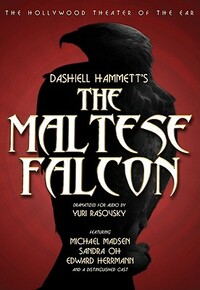Take a photo of a barcode or cover
adventurous
mysterious
dark
mysterious
tense
medium-paced
Plot or Character Driven:
Plot
Strong character development:
No
Loveable characters:
Complicated
Diverse cast of characters:
No
Flaws of characters a main focus:
Yes
As I was reading this book, I felt a lot like I did when I saw Citizen Kane for the first time; I kept thinking, "That's where this trope came from? That's where this style started?" because if you were to look up in the dictionary the definition of "Anti-Hero", I dare you to find a character more fitting of that title than Dashiell Hammett's Sam Spade. This man is arrogant, egotistical, completely selfish and totally confident in his own abilities. Every single person in his life, regardless of how he feels about them, he uses to his own ends. No one, and I mean no one, is as valuable to him as his own safety and interests. At the same time, you can't help but root for the guy! Is he selfish, egotistical, and conscious-less? Yes. He is also by far the smartest and most insightful person in the story, in fact, one of the smartest and insightful characters I have ever seen in a book. He is always one, two, three steps ahead of everyone else, he figures out other people's agendas and angles, figures when people are lying, which helps him protect himself from the inevitable trouble he gets into. And the big reveal ending, where we find out the "heroine" of the piece, Brigid O'Shaughnessy, who has become Spade's lover, is the real killer, we are left speechless when he turns her in, both in the execution of justice and to save himself. He even lists about eight very practical reasons why this is the right thing to do: at no point in the entire story do we see the "real" Brigid, as she is a compulsive liar and master manipulator, and even more dedicated to her self-interests than Spade. She's one of the main characters of this book and yet we know absolutely nothing about her, except she will stop at nothing to get what she wants. We see her but we never know her.
Beyond the characters in this story (Gutman, Wilber and Cairo, the detectives, Effie, the Girl-Friday to Spade, are all wonderfully realized and three dimensional), the writing style was unique. It was sparse and almost brutal, but truly reflecting the "voice" of the noir novel. The descriptions of San Francisco in the 1930s is on-point, very atmospheric- you can practically smell the fog.
As a woman in the 21st century I could not help but see the toxic masculinity of this story, the sexism and homophobia that pervade not just this story, but this place and time in history. At the end of the story when the main characters gather to decide what to do, Brigid isn't even invited to the conversation, though she is the catalyst for this entire book. She is sent to the kitchen to make a meal and coffee for the men. I don't like Brigid as a person, but my God, I can understand how she became what she is when you see the patriarchal world she has to navigate without protection or agency. Did I like this book? Well, I didn't particularly like any of its characters, with the exception of Effie, but I can appreciate how well written this book is and can see why it was so hugely influential in creating the American noir, the American hero, the character that Humphrey Bogart went on to play over and over again.
Beyond the characters in this story (Gutman, Wilber and Cairo, the detectives, Effie, the Girl-Friday to Spade, are all wonderfully realized and three dimensional), the writing style was unique. It was sparse and almost brutal, but truly reflecting the "voice" of the noir novel. The descriptions of San Francisco in the 1930s is on-point, very atmospheric- you can practically smell the fog.
As a woman in the 21st century I could not help but see the toxic masculinity of this story, the sexism and homophobia that pervade not just this story, but this place and time in history. At the end of the story when the main characters gather to decide what to do, Brigid isn't even invited to the conversation, though she is the catalyst for this entire book. She is sent to the kitchen to make a meal and coffee for the men. I don't like Brigid as a person, but my God, I can understand how she became what she is when you see the patriarchal world she has to navigate without protection or agency. Did I like this book? Well, I didn't particularly like any of its characters, with the exception of Effie, but I can appreciate how well written this book is and can see why it was so hugely influential in creating the American noir, the American hero, the character that Humphrey Bogart went on to play over and over again.
fast-paced
dark
emotional
mysterious
tense
fast-paced
Plot or Character Driven:
Character
Strong character development:
Yes
Loveable characters:
Complicated
Diverse cast of characters:
Yes
Flaws of characters a main focus:
Yes
Sharp, tight writing, great characters, a challenging mystery, atmospheric settings. A great book.
mysterious
fast-paced
Plot or Character Driven:
Plot
Strong character development:
No
Loveable characters:
No
Diverse cast of characters:
No
adventurous
mysterious
medium-paced
Snappy, quick, and a lot of fun. Impossible to read without picturing Bogie, though.
dark
funny
mysterious
tense
medium-paced
Plot or Character Driven:
Plot
Strong character development:
No
Loveable characters:
Complicated
Diverse cast of characters:
No
Flaws of characters a main focus:
No





